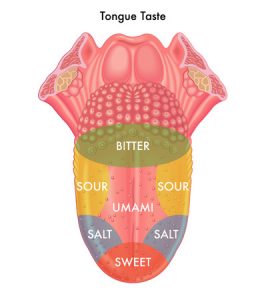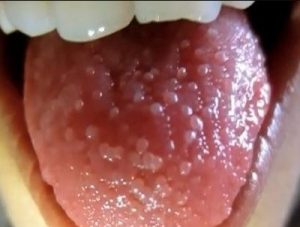What are Taste Buds?
Page Contents
Human tongue consists of about 8000 -10000 taste buds over the tiny structures called papillae. These lay on the upper surface of the tongue, the top part of the epiglottis, esophagus, and soft palate that helps to detect the different tastes of foods. Primary ones are:
- Sweet
- Salty
- Sour
- Bitter
The tip of the tongue responds to both salty and sweet foods. The sides are for sour and the back of the tongue is sensitive to bitter tastes.
Papillae are mainly of three categories
- Fungiform papillae are the most typical types found on the tip and edges on the tongue. These help us to taste different flavors as well as to check the temperature of the food items.
- Circumvallated papillae lay at the base of the tongue. They are mostly large and round and are the house of several taste buds.
- Foliate papillae clusters at the back edges of the tongue. Each of them contains hundreds of taste buds.
What is Inflamed Taste Buds?
Taste buds placed inside the tiny bumps lining the tongue can become enlarged or swollen. This swelling can cause on any one side of the tongue or cheek, soft palate and other parts of the mouth.
Causes of Inflamed Taste Buds
- Hot beverages: Sipping hot coffee/tea and even any hot food might lead to irritation and swelling of the taste buds.
- Spicy foods: Eating spicy foods, peppered items which might cause irritation and swelling on the buds.
- Infection: Viral infections in the mouth may cause inflamed and swollen taste buds.
- Trauma: Might get irritated even due to various traumas such as burning your mouth with hot foods, tongue biting or rubbing can result in swelling.
- Allergic reactions: Several foods and dental products, mouthwashes and medicines may cause swelling or inflammation in the taste buds. Some seafood, citrus foods are also a cause of allergies in the mouth.
- Tobacco and alcohol consumption: Chewing of tobacco products or even use of alcohol can be a reason. Smoking cigarettes irritate the taste buds making them dull resulting in the inability to identify different flavors.
- Stress and depression: Prolonged stress and mental issues are also a cause for irritation and inflamed taste buds. Long periods of stress create a hormonal imbalance and thus weaken the body immunity.
- Mouth diseases: Diseases like oral cancer, mouth ulcers, and oral thrush are a source of swelling and inflammation.
- Acid reflux: Regurgitated acid after entering the mouth can be too strong to handle and can irritate the tongue and especially the buds. It causes swelling in the taste buds.
- Vitamin deficiency: It may result in the sore tongue and inflamed taste buds. Vitamin C, vitamin B complex, and iron are the primary source for the good health of oral cavity. A lack of these leads to the swollen tongue and enlarged taste buds which again are symptoms for Scurvy.
- Tongue piercing: After getting the tongue pierced, infections might occur leading to inflammation, irritation, swelling, redness and even bleeding. Also discoloration of the tongue, discharge of fluids or pain may be a result of piercing. As a result, swollen taste buds at the end of the tongue or the tip may get inflamed. They get enlarged and even cause burning at the edges of the tongue with a tingling sensation on parts of the tongue.
- Dehydration: Dry or dehydrated mouth or throat may also lead to swelling of taste buds. When dry, they are more prone to irritation.
- Sexually transmitted diseases: STDs may affect the papillae and mouth causing inflammation of taste buds. These are of three types:-
- Type 1 (HSV-1) or oral herpes: They cause sores on various parts of the mouth and tongue making the taste buds very swollen and painful.
- Type 2: Also known as syphilis, it causes sores on the mouth and lips making the taste buds inflamed.
- Type 3: A form of oral gonorrhea, it leads to itching, sore throat and difficulties in swallowing. White or yellow discharges are also present causing swelling in taste buds.
Diagnosis of Inflamed Taste Buds
Doctors diagnose the condition by examining the tongue for the following parameters:
- Color
- Texture
- Appearance
- Size
They might even touch the surface of the tongue to check if any lumps or pain is present. In case, he finds a symptom of oral cancer, and he would advise a biopsy. This test will need to remove a small sample of tissue from the tongue for examining.
Treatments for Inflamed Taste Buds
- One can treat the Infected ones caused by bacteria or fungal reactions through use of antibiotics, antiviral and antifungal under the prescription of the doctor
- Antacids might help in curing the swollen taste buds caused by acid reflux
- Consuming vitamins and mineral capsules or supplements can cure inflammation of taste buds if caused by deficiency
Home Remedies
- Maintain oral hygiene to keep it safe. Brush twice a day, use antiseptic mouthwashes to prevent bacterial or other infections
- Quit smoking as it increases the risk of gum diseases and oral cancer
- Avoid spicy and hot foods to lessen the irritation
- Gargle three times a day with lukewarm water and salt
- Rubbing gently over the tongue with ice can give relief to the irritation and prevent swelling
- Application of baking soda is helpful as it cools the irritating part and relives the swelling too
- Rinse your tongue with the tea tree oil by mixing some drops into lukewarm water and then gargle it
- Eat more foods containing ginger, garlic, and pepper which will reduce the irritation and prevent it from further infection
- Apply honey on the surface of the tongue over the affected area, and it helps in healing and preventing anti-bacterial infections
- Glycerin also relives the inflamed taste buds if caused by mouth sores, any trauma or any injury
- Stay hydrated with enough water if the inflamed taste buds occur as a result of dehydration and dry mouth or throat
- Yoghurt with probiotics will help to reduce the swelling of the taste buds especially in case of swelling due to dry mouth
- Drink cold beverages instead of hot drinks which would help to sooth the tongue.
When to call a doctor?
Swelling of taste buds is a common issue, and it happens due to spicy or allergic reactions in the tongue. It usually disappears rather quickly after few hours or days on its own. In case of infection, the swelling won’t go until the infection gets wholly cured. At times when the situation gets serious, the home remedies won’t work. In case of prolonged swelling of the taste bud for about a week, the doctor and proper medication are required.


